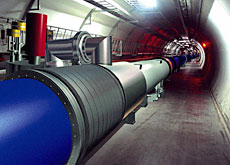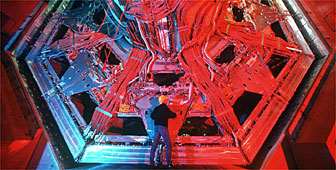Future of computing goes online

The Geneva-based European Organization for Nuclear Research (Cern) has launched the first phase of what could be the future of computing.
Cern’s Grid, which links computing resources in different countries, is designed to handle the huge amounts of data generated by the laboratory’s Large Hadron Collider.
Scientists working at the physics centre realised that their new particle accelerator, which should enter service in 2007, would produce data equivalent to 20 million CDs.
Storing the results from the LHC as its also known was just one part of the equation. Analysing the data would also be problematic, as it would require the computer power of 70,000 of today’s fastest PCs.
Rather than invest in new computing resources, Cern opted for a different solution. Its Grid links computer centres around the globe, creating a kind of virtual resource service.
A scientist will therefore be able to harness the power of a supercomputer in another country as though it were in the next room.
“The idea is that you have distributed resources that can be almost anywhere,” said Ian Bird, head of Grid deployment at Cern.
Access to resources
“The Grid is in essence me sitting at my computer and getting access to huge resources that are just not available in one single place.”
Cern is already famous throughout the computer universe as the birthplace of the World Wide Web, which gave a user-friendly face to the internet. The Grid is aimed at taking that thinking a step further.
“The Web was basically dealing with sharing information,” Bird told swissinfo. “It gave people access to documents or databases, whereas the Grid gives me access to resources.”
Bird said the new system is analogous to the power grid. Users don’t care where electricity comes from, only whether it’s available.
The first phase of the project involves running a series of prototype services whose size and complexity will increase over time.
The new system determines what resources are required for a specific job, arranges for computer time anywhere around the world, and returns the results to the researcher.
The Grid will initially link up computer centres in 16 countries. Data analysis testing will begin in 2004 to see if the system is up to the challenge of handling a complex workload.
The European Union is funding planned grids for science and industry, and companies have shown an interest in the new technology.
Future applications
However, Bird says that nobody really knows what implications Grid computing will actually have in the future.
“When the Web came about, nobody foresaw the applications we see today,” he said. “It’s very hard to predict where the Grid will go, but to provide people with unheard-of computer resources just opens up the possibilities.”
One of the hurdles faced by the Grid’s designers is transferring huge amounts of information around the world, and making sure the network can handle the workload.
That difficulty is gradually being overcome. In a recent groundbreaking test, Cern’s scientists were able to transfer data equivalent to the contents of a single DVD to California’s Institute of Technology in just seven seconds.
swissinfo, Scott Capper
Cern in Geneva is the European Organisation for Nuclear Research, the world’s largest particle physics centre, where researchers study the nature of matter.
Founded in 1954, Cern was one of Europe’s first joint ventures and now has 20 member states.
The Large Hadron Collider will be the most powerful instrument ever built to investigate the properties of particles.
The Grid’s processing power will initially be used to analyse data generated by the LHC.

In compliance with the JTI standards
More: SWI swissinfo.ch certified by the Journalism Trust Initiative


You can find an overview of ongoing debates with our journalists here. Please join us!
If you want to start a conversation about a topic raised in this article or want to report factual errors, email us at english@swissinfo.ch.